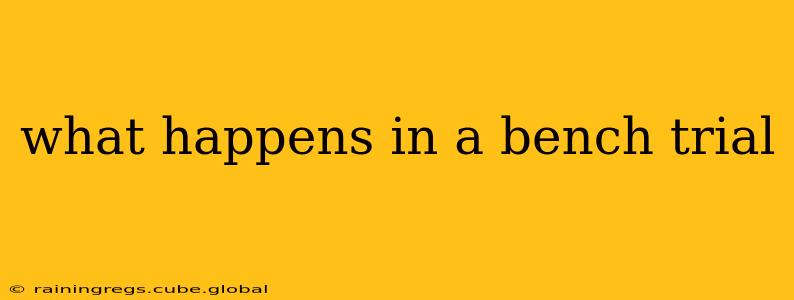What Happens in a Bench Trial? A Comprehensive Guide
A bench trial is a trial where the judge, rather than a jury, acts as the fact-finder. This means the judge decides the facts of the case and applies the law to those facts to reach a verdict. Unlike a jury trial where a jury determines guilt or liability, in a bench trial, the judge assumes both roles: fact-finder and law applier. This article will delve into what happens during a bench trial, exploring its key differences from a jury trial and answering common questions.
What are the Stages of a Bench Trial?
While the specific procedures can vary slightly by jurisdiction and the type of case, a typical bench trial generally unfolds in these stages:
-
Opening Statements: Both the plaintiff (in a civil case) or prosecution (in a criminal case) and the defense present their opening statements, outlining their case and what they intend to prove. This sets the stage for the evidence to be presented.
-
Presentation of Evidence: This is the heart of the trial. Both sides present their evidence, which can include witness testimony, documents, photographs, and expert opinions. The judge actively listens, observing the demeanor of witnesses and evaluating the credibility of the evidence. Objections to evidence are made and ruled upon by the judge.
-
Closing Arguments: After the presentation of evidence, both sides present closing arguments summarizing their case and arguing why the judge should rule in their favor. They highlight the strengths of their evidence and the weaknesses of the opposing side's case.
-
Judge's Decision: Unlike a jury trial where the jury deliberates and returns a verdict, the judge in a bench trial renders the decision immediately or after a brief recess. The judge explains the reasoning behind the decision, detailing which evidence was considered most persuasive and how the law applies to the facts.
What is the Difference Between a Bench Trial and a Jury Trial?
The most significant difference lies in who decides the facts of the case. In a jury trial, a panel of citizens weighs the evidence and determines the facts. The judge in a jury trial instructs the jury on the law and presides over the proceedings but doesn't determine the facts. In a bench trial, the judge acts as both the fact-finder and the judge of the law. This means the judge assesses the credibility of witnesses, weighs the evidence, and applies the relevant legal principles to reach a verdict.
Why Would Someone Choose a Bench Trial?
There are several reasons why a party might opt for a bench trial:
-
Complexity of the Case: In cases involving complex technical or legal issues, a party might believe a judge, with their legal expertise, is better equipped to understand and apply the law than a jury.
-
Concern about Jury Bias: If there is concern about potential bias from a jury based on the nature of the case or the parties involved, a bench trial might be preferred.
-
Efficiency: Bench trials are often shorter and more efficient than jury trials, as jury selection and deliberation are eliminated.
-
Control Over the Proceedings: Some parties prefer a bench trial due to the perceived greater control over the proceedings and the presentation of evidence.
What are the Advantages and Disadvantages of a Bench Trial?
Advantages:
- Efficiency: Usually faster and less expensive than jury trials.
- Expertise: The judge is an expert in the law.
- Reduced Risk of Bias: (Although judge bias is still possible)
- Greater Control: Parties may feel they have more control over the proceedings.
Disadvantages:
- Potential for Bias: The judge, being human, could still harbor unconscious biases.
- Limited Perspective: Lacks the diverse perspectives of a jury.
- Appeal Process: The appeals process might be more difficult, as the judge is both the finder of fact and the law applier.
Can I Choose a Bench Trial?
In most jurisdictions, both the prosecution and the defendant in a criminal case, and both parties in a civil case, typically have the right to request a bench trial. However, the judge ultimately has the authority to grant or deny the request, depending on the specific circumstances and legal precedents.
How Long Does a Bench Trial Last?
The length of a bench trial varies significantly depending on the complexity of the case, the amount of evidence presented, and the judge's schedule. It can range from a single day to several weeks.
In conclusion, a bench trial offers a distinct alternative to a jury trial, providing its own set of advantages and disadvantages. Understanding this process is crucial for anyone facing legal proceedings, regardless of whether they choose a bench trial or a jury trial. Consulting with legal counsel is always advisable when navigating the complexities of the legal system.
